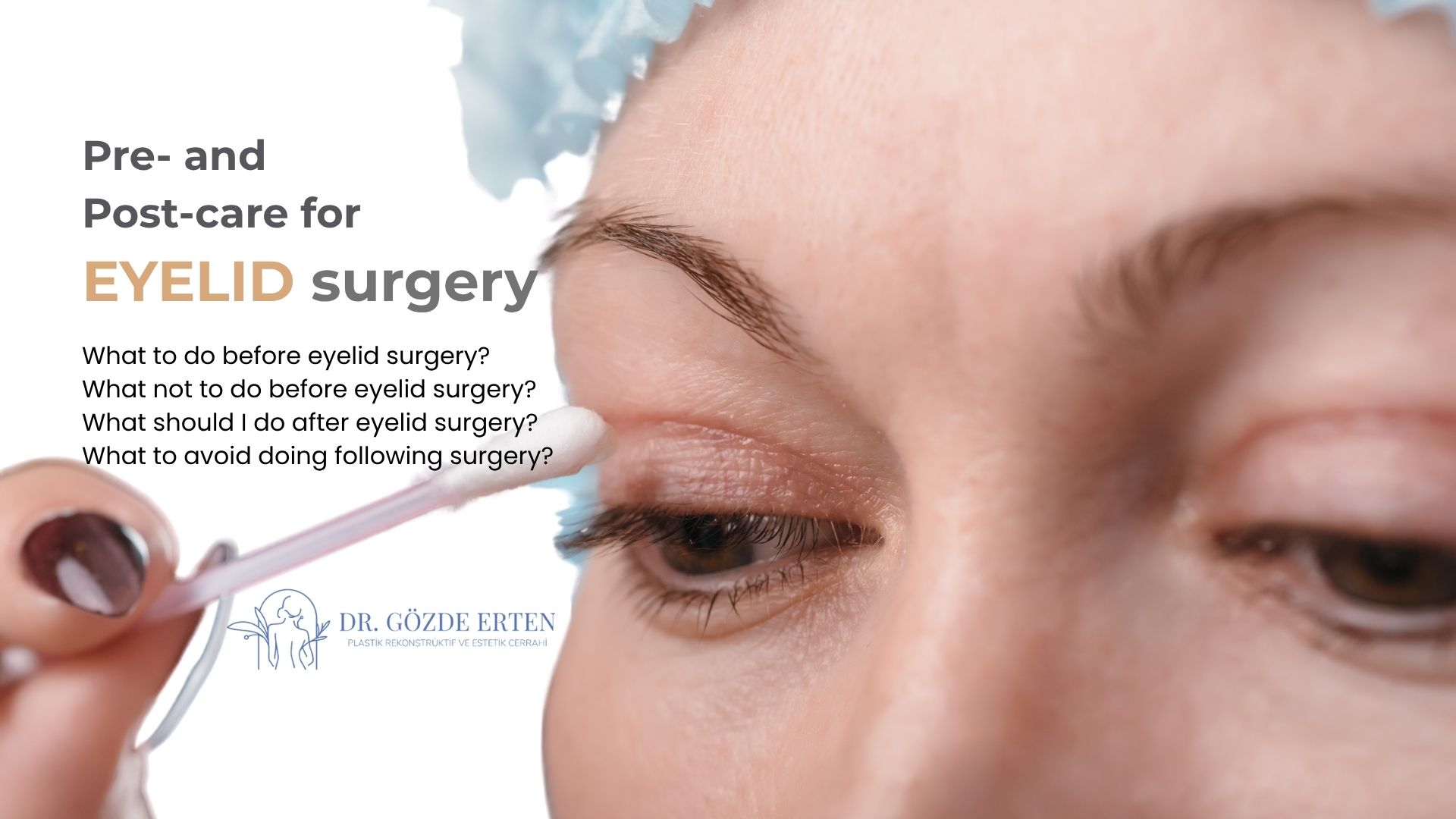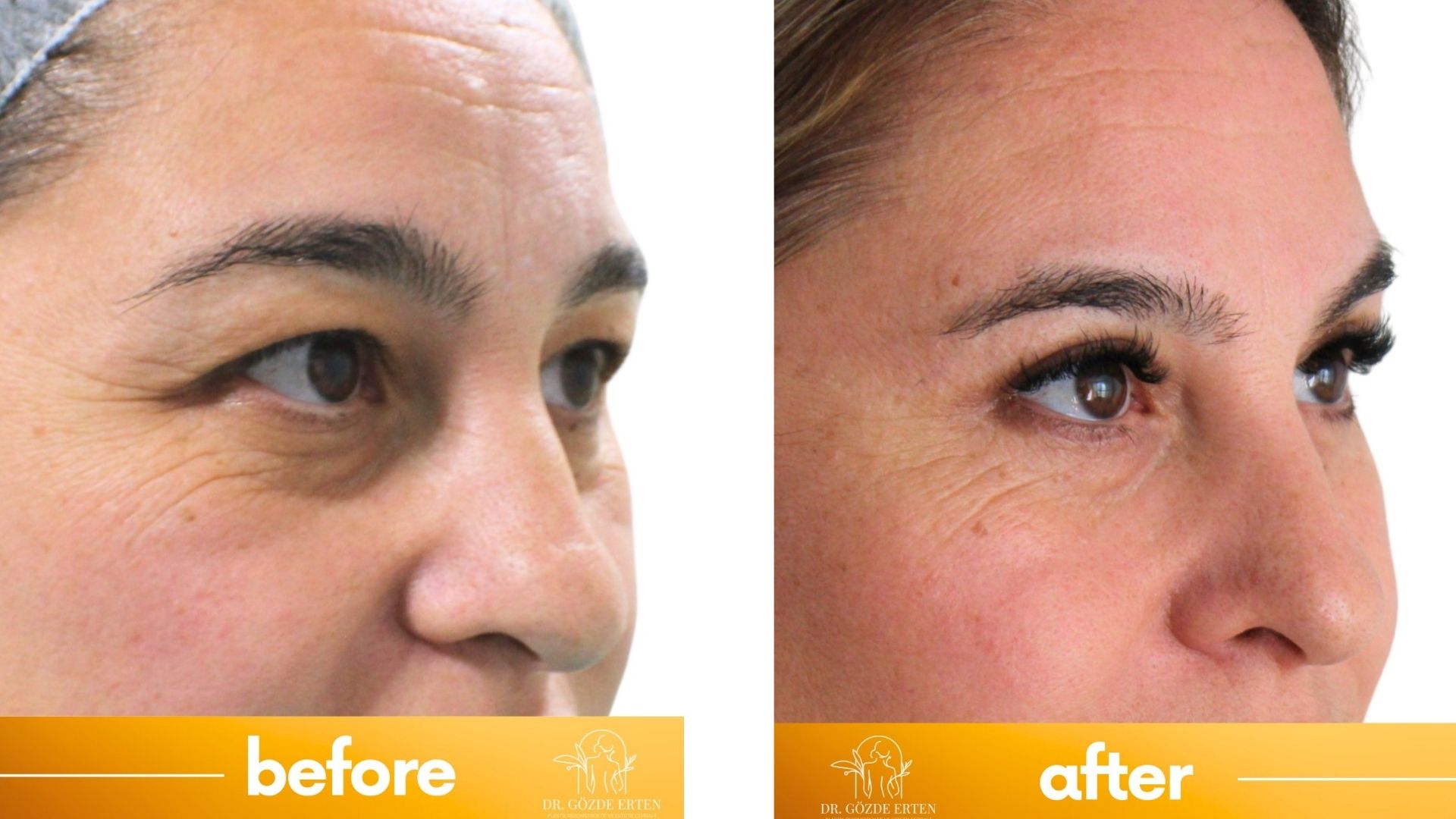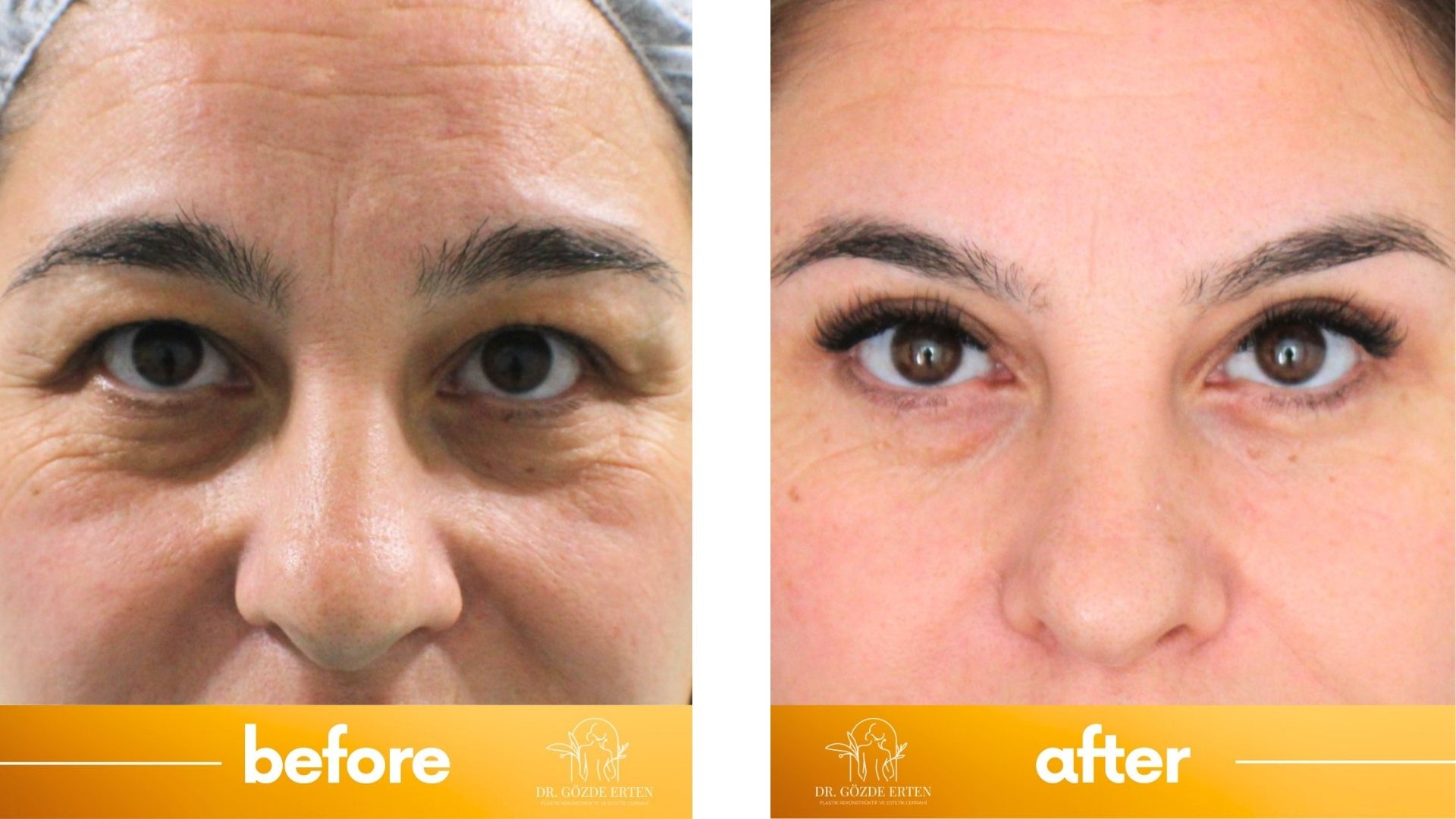Pre and Post Care for Eyelid Surgery in Turkey Ankara Aesthetics Clinic

What to do before eyelid surgery?
To guarantee a good outcome and reduce the risk of problems, there are a few crucial things you should do before having eyelid surgery, often known as blepharoplasty.
- A board-certified plastic surgeon with experience doing eyelid surgery should be consulted as the initial step. You can talk about your objectives, medical background, and any worries you may have throughout the appointment. To assess if you are a good candidate for the treatment, the surgeon will also examine your eyelids.
- You will receive detailed instructions from your surgeon on how to be ready for the procedure, including what drugs to avoid, what to eat and drink, and when to quit smoking.
- After the procedure, you will need to make arrangements for a ride home because you won't be able to drive on your own. Having someone remain with you the first night following surgery is also a smart move.
- To recuperate from the operation, you will need to take time off of work and other commitments. Plan to take at least a week off work and, and for many weeks, refrain from vigorous activity.
- You will receive detailed instructions from your surgeon on how to take care of your eyes following surgery, including how to clean your incisions, when to apply ice, and how to handle any discomfort. Make sure you have all the tools you'll need, including gauze, eye drops, and painkillers.
What not to do before eyelid surgery?
There are several things you should refrain from doing before having blepharoplasty. The following are some things you ought to avoid doing:
- Before the procedure, your surgeon will give you detailed advice on which drugs to avoid. Aspirin, ibuprofen, and other blood-thinning drugs may be included in this, as they might raise the risk of bleeding during surgery. Additionally, stay away from herbal supplements because they can raise the chance of bleeding.
- Smoking and the use of other tobacco products can slow the healing process and raise the chance of problems. If you smoke, you should quit at least two weeks before the procedure, and you should abstain from using tobacco products for a few weeks following the procedure.
- You should abstain from alcohol for at least 24 hours before surgery since it can affect anaesthetic and raise bleeding risks.
- If you wear contact lenses, you should take a few days off before the procedure. Instead, put on your glasses at that moment.
- You must fast for several hours. You'll receive detailed instructions from your surgeon on when to cease eating and drinking.
What should I do after eyelid surgery?
Following blepharoplasty, it's crucial to adhere to your surgeon's detailed postoperative recommendations to ensure a quick and safe recovery. What to do after eyelid surgery is outlined in the following:
- Rest and avoid any heavy activity for the first several days following surgery. This will lessen swelling and aid the healing process.
- You should apply cold compresses to the eyes for 10-15 minutes at a time, multiple times throughout the day, to assist in minimising swelling and bruising.
- To assist with managing pain and preventing infection, your surgeon may prescribe antibiotics or painkillers. Take these drugs exactly as prescribed.
- To help with swelling reduction in the first few days following surgery, you should sleep with your head raised.
- For at least two weeks following surgery, you should refrain from engaging in any actions that might increase blood flow to the eyes, such as bending over or carrying heavy things. For a week or two, you should also refrain from wearing contact lenses.
- You will receive detailed instructions from your surgeon on how to clean and care for your wounds. To encourage healing and reduce the chance of infection, it's crucial to carefully adhere to these directions.
- You must show up for follow-up appointments with your surgeon to track your recovery and make sure you are progressing as expected.
You may assist in guaranteeing a safe and effective recovery from eyelid surgery by adhering to these recommendations. Talk to your surgeon about any worries or enquiries you may have.
What to avoid doing following blepharoplasty?
To guarantee adequate and fast healing and prevent problems, here are a few basic suggestions for what to avoid doing following blepharoplasty:
- After blepharoplasty, it's crucial to refrain from touching or rubbing your eyes since this might harm the surgical incisions and cause infection or other issues.
- To help your wounds heal correctly, your surgeon may advise against getting them wet during the first several days following surgery. This entails staying away from activities like taking a shower and swimming.
- After blepharoplasty, it's crucial to avoid activities that might raise your blood pressure or strain your eyes. This involves bending over, carrying large items, and doing demanding exercise.
- To prevent discomfort or harm to the incisions, you might be instructed to refrain from wearing contact lenses for a few weeks following surgery.
- It's crucial to postpone putting eye makeup and using any cosmetics on the incision site until your surgeon gives the all-clear.
- It's crucial to refrain from driving until your surgeon gives the all-clear, which is usually after you've stopped taking painkillers and your eyesight has fully returned.
- It's crucial to show up for all of your surgeon's scheduled follow-up sessions in order to guarantee appropriate healing and handle any potential issues or problems.
- Remember that every patient's recovery is distinct, and your surgeon can give you additional advice depending on your particular requirements and circumstances. Throughout your rehabilitation, always speak with your surgeon if you have any queries or worries.
Eyelid surgery before and after in Turkey, Ankara


Frequently Asked Questions
Does blepharoplasty leave scars?
Similar to every surgical surgery, blepharoplasty leaves some scarring behind. However, blepharoplasty scarring is often not severe and blends in well with the natural curves of the eyelids. Your surgeon will make a few tiny incisions in the upper eyelids' natural creases or the lower eyelids' lash lines during the operation. These cuts are made to blend in with the eyelids' natural folds and curves and to reduce scarring. Your surgeon will also take care to carefully heal the wounds with tiny stitches or surgical glue to reduce any remaining visible scars.
Any scarring from a blepharoplasty will often decrease dramatically over time, frequently becoming scarcely perceptible within a few months. To guarantee complete healing and lessen the visibility of any ensuing scars, it's critical to carefully adhere to your surgeon's post-operative care recommendations. Although blepharoplasty may leave some scars, many patients claim that they are considerably outweighed by the positive effects of the treatment. Along with the potential advantages and expected results of the treatment, your surgeon can go through any possible dangers or consequences of blepharoplasty, including any possible scarring.
Is eyelid surgery safe in Turkey?
Like any surgical treatment, eyelid surgery involves certain possible risks and drawbacks. However, when performed by a trained and experienced surgeon at a recognised and certified institution, eyelid surgery is generally considered safe. Many Turkish plastic surgeons are skilled and experienced in doing eyelid surgery, and Turkey has a well-established and respectable medical tourism sector. In addition, a lot of facilities in Turkey have accreditation from international bodies like the Joint Commission International (JCI), which guarantees that the facility satisfies strict quality and safety requirements.
You should carefully pick a licensed and skilled surgeon, as well as a renowned and authorised facility, before having eyelid surgery in Turkey to ensure its safety. To reduce the risk of difficulties, you should also carefully follow your surgeon's pre- and post-operative instructions and discuss the risks and probable consequences of the procedure with them. Overall, eyelid surgery in Turkey is a technique that may be safe and successful with the right research and safeguards.
How do you clean your eyes after upper blepharoplasty?
After upper blepharoplasty, your surgeon will give you detailed instructions on how to clean your eyes because the cleaning procedure may differ based on the type of surgery you underwent and the particular aftercare regimen your physician suggests. Here are some broad principles, though:
- Before touching your eyes or incisions, thoroughly wash your hands with soap and water.
- Gently wipe your eyelids and incisions with a clean, soft cloth or gauze pad. Your surgeon may advise you to use a specific cleaning agent or saline solution.
- When washing your eyes, use extreme gentleness and avoid touching or scrubbing the incisions.
- Pat your eyelids dry with a clean, soft cloth or gauze pad.
- Rinse your eyes with lukewarm water to get rid of any leftover cleaning solution.
You must carefully follow your surgeon's specific post-operative care instructions, as they may vary based on your unique requirements and circumstances. Based on your particular circumstance, your surgeon could advise additional safety measures or provide you with specific cleaning instructions. Always consult your surgeon if you have any questions or concerns about cleaning your eyes following an upper blepharoplasty.
Please contact us for additional information or to schedule a consultation at Gozde Erten Aesthetics Clinic.
